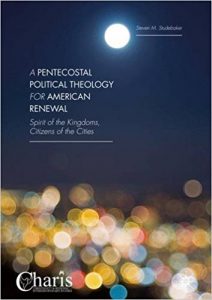Since the beginning of the 2016 presidential race Christians in America have anointed their candidate with a prophetic mantle. Christians on the right and left have espoused their peculiar blends of Christian faith and American politics, and of course since both are inspired of God, both must be right. But the division, which borders on ecclesiastical schizophrenia, has left the church with a confused voice. In the midst of the confusion, Steven M. Studebaker has offered A Pentecostal Political Theology for American Renewal: Spirit of the Kingdoms, Citizens of the Cities.

Studebaker’s thesis is that a Pentecostal political theology is based upon a “pneumatological realism” which reminds us that Christians “live in an eschatological liminal space” awaiting the consummation of God’s kingdom. Within this liminal space, all nations and cities of the world are Babylon and within the domain of Babylon the Holy Spirit is moving to transform the “material conditions of life, which includes culture” (5). Speaking to the American context, the Spirit “warns against the triumphalism of American civil religion.” Christians should discern the United States of America not as indispensable, but as blessed, sometimes evil, and “as a place where the Spirit of Pentecost is at work. . .” (7).
This book is presented in three parts: (1) American Decline, (2) A Political Theology of the Spirit, and (3) The Spirit and National Renewal.
As it happened, I was reading through 1 &2 Chronicles simultaneous with part one of this book. I found the parallels astounding. The sin, decline, and judgement of Israel corresponded with the sinfulness, decline, and impending judgement of American culture. The corruption of Israel was not just evil kings who promoted idolatry, but also priests and prophets who colluded, and the people who shouted a loud, “Amen!” Studebaker’s command of the issues is impressive. He believes the USA is in an inevitable decline and both major parties, and the people who support them, have equal share of the blame. The USA of the 21st century is impotent, broke, and brainless.
Studebaker then considers various visions of political theology. He reviews the contributions of theologians from Augustine and Luther to Brueggeman and Hauerwas. He demonstrates the contradictions inherent in the dualism of various streams of thought. Neither Christian Nationalism nor Margins Christianity is a coherent alternative. A Pentecostal political theology must recognize “the goodness that pervades culture, even cultures shaped by empire, and the place of culture and creation in God’s redemptive work” (135).
The heart of Studebaker’s thesis is the materiality of Pentecostal praxis. Pentecostal spirituality is an embodied, physical, material spirituality. The Holy Spirit moves over the surface of the earth and is poured out upon creation. Spirit-baptism is the outpouring and infilling of embodied humans. Therefore, “the Spirit is the source of the city” and the “source of citizenship in the life of the city.” The moving of the Spirit through Babylon (the cities of humanity) means “the cultural aspirations and activities that take place in this world emerge from the creative-redemptive work of the Spirit” (141). Even in Babylon “cultural values, institutions, and practices that promote human flourishing can arise from, and participate in, the Spirit of Pentecost” (173). The Spirit works to form the foundation of New Jerusalem within Babylon. Just as the human body must die to be glorified, Babylon likewise will perish so that it can be raised to new life – New Jerusalem.
The final part of the book addresses the renewal of American culture. Studebaker writes that “the right’s effort to recover Christendom and the left’s effort to establish the kingdom of social justice” is theologically wrongheaded (203). The New Jerusalem is global, multicultural, and eschatological. The Spirit of Pentecost chastens American triumphalism, elitism, and consumerism. Even so, “the cultural blessings found in America can be understood as historical and collective way a community of people have embodied the Spirit-breathed image of God” (224).
Studebaker offers a thought provoking book. If you are willing to look beyond partisan politics and discern the move of the Spirit, this book offers a good start.
